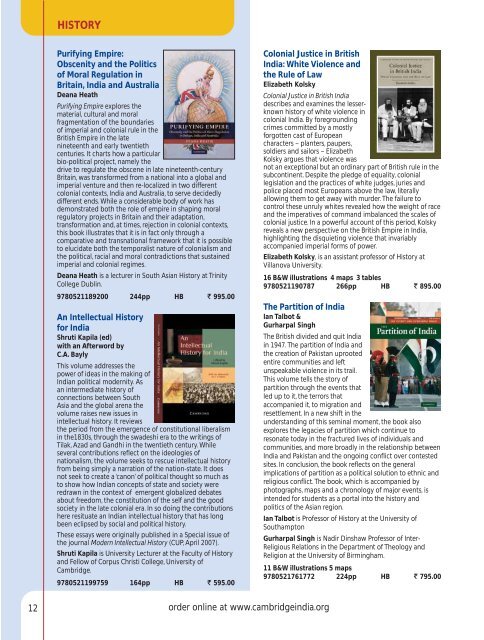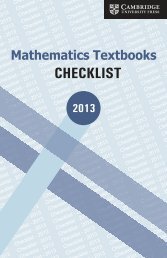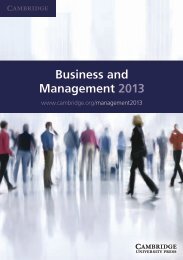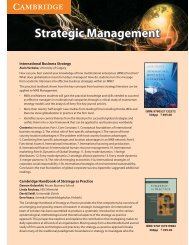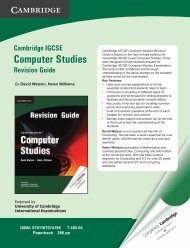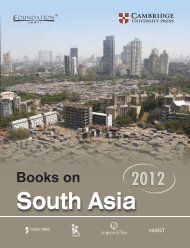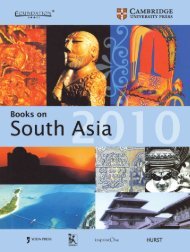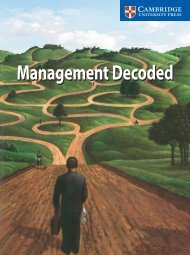India & Cambridge - Cambridge University Press India
India & Cambridge - Cambridge University Press India
India & Cambridge - Cambridge University Press India
- No tags were found...
You also want an ePaper? Increase the reach of your titles
YUMPU automatically turns print PDFs into web optimized ePapers that Google loves.
HISTORYPurifying Empire:Obscenity and the Politicsof Moral Regulation inBritain, <strong>India</strong> and AustraliaDeana HeathPurifying Empire explores thematerial, cultural and moralfragmentation of the boundariesof imperial and colonial rule in theBritish Empire in the latenineteenth and early twentiethcenturies. It charts how a particularbio-political project, namely thedrive to regulate the obscene in late nineteenth-centuryBritain, was transformed from a national into a global andimperial venture and then re-localized in two differentcolonial contexts, <strong>India</strong> and Australia, to serve decidedlydifferent ends. While a considerable body of work hasdemonstrated both the role of empire in shaping moralregulatory projects in Britain and their adaptation,transformation and, at times, rejection in colonial contexts,this book illustrates that it is in fact only through acomparative and transnational framework that it is possibleto elucidate both the temporalist nature of colonialism andthe political, racial and moral contradictions that sustainedimperial and colonial regimes.Deana Heath is a lecturer in South Asian History at TrinityCollege Dublin.9780521189200 244pp HB ` 995.00An Intellectual Historyfor <strong>India</strong>Shruti Kapila (ed)with an Afterword byC.A. BaylyThis volume addresses thepower of ideas in the making of<strong>India</strong>n political modernity. Asan intermediate history ofconnections between SouthAsia and the global arena thevolume raises new issues inintellectual history. It reviewsthe period from the emergence of constitutional liberalismin the1830s, through the swadeshi era to the writings ofTilak, Azad and Gandhi in the twentieth century. Whileseveral contributions reflect on the ideologies ofnationalism, the volume seeks to rescue intellectual historyfrom being simply a narration of the nation-state. It doesnot seek to create a ‘canon’ of political thought so much asto show how <strong>India</strong>n concepts of state and society wereredrawn in the context of emergent globalized debatesabout freedom, the constitution of the self and the goodsociety in the late colonial era. In so doing the contributionshere resituate an <strong>India</strong>n intellectual history that has longbeen eclipsed by social and political history.These essays were originally published in a Special issue ofthe journal Modern Intellectual History (CUP, April 2007).Shruti Kapila is <strong>University</strong> Lecturer at the Faculty of Historyand Fellow of Corpus Christi College, <strong>University</strong> of<strong>Cambridge</strong>.9780521199759 164pp HB ` 595.00Colonial Justice in British<strong>India</strong>: White Violence andthe Rule of LawElizabeth KolskyColonial Justice in British <strong>India</strong>describes and examines the lesserknownhistory of white violence incolonial <strong>India</strong>. By foregroundingcrimes committed by a mostlyforgotten cast of Europeancharacters – planters, paupers,soldiers and sailors – ElizabethKolsky argues that violence wasnot an exceptional but an ordinary part of British rule in thesubcontinent. Despite the pledge of equality, coloniallegislation and the practices of white judges, juries andpolice placed most Europeans above the law, literallyallowing them to get away with murder. The failure tocontrol these unruly whites revealed how the weight of raceand the imperatives of command imbalanced the scales ofcolonial justice. In a powerful account of this period, Kolskyreveals a new perspective on the British Empire in <strong>India</strong>,highlighting the disquieting violence that invariablyaccompanied imperial forms of power.Elizabeth Kolsky, is an assistant professor of History atVillanova <strong>University</strong>.16 B&W illustrations 4 maps 3 tables9780521190787 266pp HB ` 895.00The Partition of <strong>India</strong>Ian Talbot &Gurharpal SinghThe British divided and quit <strong>India</strong>in 1947. The partition of <strong>India</strong> andthe creation of Pakistan uprootedentire communities and leftunspeakable violence in its trail.This volume tells the story ofpartition through the events thatled up to it, the terrors thataccompanied it, to migration andresettlement. In a new shift in theunderstanding of this seminal moment, the book alsoexplores the legacies of partition which continue toresonate today in the fractured lives of individuals andcommunities, and more broadly in the relationship between<strong>India</strong> and Pakistan and the ongoing conflict over contestedsites. In conclusion, the book reflects on the generalimplications of partition as a political solution to ethnic andreligious conflict. The book, which is accompanied byphotographs, maps and a chronology of major events, isintended for students as a portal into the history andpolitics of the Asian region.Ian Talbot is Professor of History at the <strong>University</strong> ofSouthamptonGurharpal Singh is Nadir Dinshaw Professor of Inter-Religious Relations in the Department of Theology andReligion at the <strong>University</strong> of Birmingham.11 B&W illustrations 5 maps9780521761772 224pp HB ` 795.0012 order online at www.cambridgeindia.org


